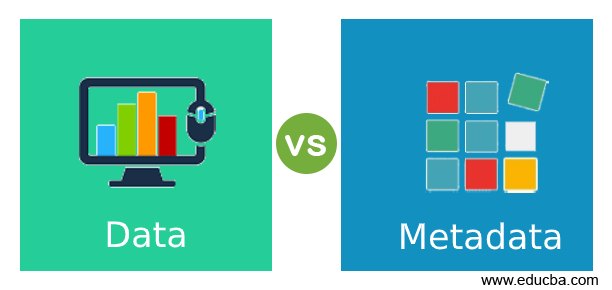Updated July 3, 2023
Difference Between Data vs Metadata
Data vs Metadata, the information processed in the computer for further usage by anyone who uses the applications is called data. Data helps to gain knowledge about the application or software and its history and to gain insights about the same. This helps to develop the application for further updates and to help the developers further with the application. Even the webpages have some information about metadata and have metatags to classify them.
Head to Head Comparison Between Data vs Metadata (Infographics)
Below are the top 8 Comparisons between Data and Metadata
Key Differences of Data vs Metadata
Let us study some important key differences between Data and Metadata:
- Any information is data. At the same time, metadata is the classified information and is more detailed and defined in the system. They give information such as date, size, image numbers, and any other relevant information.
- Data is a collection of information, but it does not add context to them. Data gives information such as different names, maybe different dates, or other information but does not say where it came from and how it works in the system. Data does not have login information, and this makes the data give information to anyone who asks them.
- When the user needs just information about an application or software and does not require more details of those, then data becomes handy to them. Data does not take any ownership of the information it provides, and it is solely the responsibility of the user to manage and know the type of data they are looking for. But metadata takes ownership of the data it provides with proper rights approved to the user. This helps to manage the data they need and know the details of the data provided and asked by each user in the system.
- But metadata helps in information retrieval and proper classification of the data to help the developers to process them for further needs in the system.
Comparison Table of Data vs Metadata
Below is the comparison table:
|
Data |
Metadata |
| We cannot say that data gives information about the applications as much as we need. It gives some information but not necessarily relevant information. | Metadata by itself gives detailed information about the data and its instances. |
| The description of the resources is not done in the data. | They just dig out the information, find the resources, and give details about the resources as well. |
| Managing users is not a task assigned to data. They don’t know any details of the users and give information about whatever they ask for. | Metadata allows for easy management of users by storing their login details and tracking the time they utilize the system. Also, metadata classifies the kind of information users need from the system. |
| Data cannot help much in migration and description of data as it does not have any other details that help in migration. | Metadata helps in data migration and in discovering various instances of data. This makes the system work well with the data to know their working level and to get information regarding past performances. |
| Data is not always assured as processed. data. | Unprocessed data makes the work more hectic while discovering data for migration or checking the facts. |
| Data Manipulation Language updates information about the data and makes them work in the system when the user needs information. | Data Definition Language updates metadata in the data dictionary and keeps them current. This makes it relevant in day to day life of the user. |
| Data does not show the location of the data, and we cannot use them in the future without processing them. | Either for structured or unstructured, metadata shows the location of the data and saves relevant data for future use. |
| When an image or document is saved, the text or image is the data in the system. Or in a program, the class or function is data. | The metadata captures important details about files, such as the timestamp of when an image or text was saved. |
Conclusion
Mostly data and metadata are stored separately, where metadata provides links to the details of the information provided by the data. Hence, the data gives information about everything, including metadata. Metadata gives information about the data.
Recommended Articles
This is a guide to Data vs Metadata. Here we discuss the difference between Data vs Metadata, key differences, and comparison table. You can also go through our other related articles to learn more –




